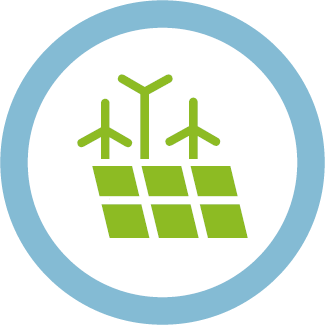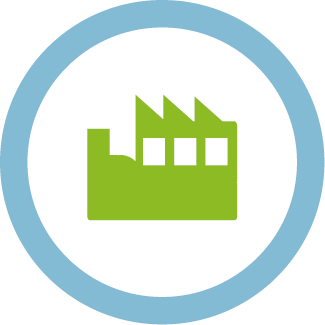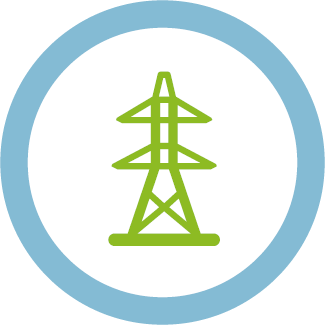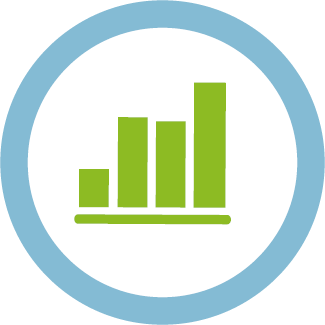Systems Analysis Research Network

The Energy System Analysis Research Network was founded in 2015 to bundle the funding activities of the Federal Ministry for Economic Affairs and Climate Action in the field of energy system analysis. Furthermore, it aims to strengthen the networking of actors and to jointly discuss impulses for the design and further development of energy system analysis. Among other things, the goal is to make the modelling tools used more transparent and comparable in terms of scientific quality control, and to support their practical transfer to industry, politics and society.
In the Systems Analysis Research Network, experts can network with each other beyond their specialist areas and jointly develop strategies and concepts for new and existing modelling tools. This increases the transparency and comparability of research results and helps to find creative solutions to complex problems.
The network focuses on the development and improvement of system analytical methods and models. A system model serves to relate complex facts and interrelationships and to simplify them to such an extent that statements can be made about the effects of small changes in the system. In order to create as accurate a representation of reality as possible, a wide variety of aspects from different disciplines must be included. Therefore, the network is made up of representatives from a wide range of disciplines from mathematics, computer science and natural sciences to social sciences and law.
Models for innovative energy systems
In developing models and methods, the members deal with both behavioural economics and the effects of regulatory frameworks on social and economic decision-making processes. New and innovative technologies often encounter barriers at the beginning of their market introduction, not only in the market itself, but also in the spatial social system. These barriers must also be mapped correctly and comprehensibly so that political and economic actors have a reliable basis for decision-making.
One example is the model experiments (MODEX) funded by the Federal Ministry of Economics and Climate Action on current systems analysis issues.
Another focus of the network is the transparency of energy system models. Only if models are open and projects work with detailed documentation are the results comprehensible and can be validated by other users. Open data and open standards also make it easier for different actors to exchange information and work together on model tools. In this way, the quality of a model or a tool can be determined and improved more reliably.
Since the founding of the Energy System Analysis Network in 2015, the members have been exchanging expertise and working together on solutions at events and in the working groups. The annual conferences offer the opportunity to discuss the further design and structure of the research network in an open forum in various formats.
Flexible working groups
The members of the research network have divided themselves into five working groups, each of which deals with four aspects of systems analysis. Any member who would like to contribute to the content can join these groups. These working groups are also networked with each other and support each other on specific issues. The topics that the working groups deal with were developed by the members at the first annual conference in December 2015 and serve as content guidelines for the network. The focal points are not to be understood as fixed, but can change in the course of the network's work and thus be flexibly adapted to current processes.
The office of the Research Network Energy System Analysis is located at the Project Management Jülich as a partner of the BMWK for the research management of the funded projects. The working groups are open to all interested parties who would like to contribute in terms of content.
This working group (WG) deals with the conceptual design and development of data infrastructures. In order to be able to deal sensibly with the ever-increasing amounts of data, data must be better collected, evaluated and networked. This includes, for example, the development of common and standardised databases. In this way, different models can be linked and related to each other. Consistent data and data sets are also important in order to create comparability and transparency. In this context, the WG is also concerned with the licensing of the databases used, as both commercial and open data solutions have advantages and disadvantages. Especially in the area of open source, the documentation of data in the form of metadata is essential. For this, it is important to create uniform ontologies and standards. In addition, there are legal aspects of comprehensive databases as well as data quality and security.
Contact
Carsten Hoyer-Klick
E-Mail: carsten.Hoyer-Klick@dlr.de
Website: DLR Institute for Technical Thermodynamics
Ludwig Hülk
E-Mail: ludwig.huelk@rl-institut.de
Website: Reiner Lemoine Institut
The working group (WG) deals with the multitude of active and future actors within networked energy systems. Due to the coupling of the electricity, heat and transport sectors, new players with different needs will be added in the future. The future decrease in flexibility will also bring new actors onto the playing field to replace the role of conventional power plants. The constantly changing landscape of actors will change the structures of the energy system of the future. This working group therefore analyses methods from the social sciences, psychology and market research and develops concepts to be able to map predictions on actor behaviour in the corresponding models. Other focal points of this working group are the current legal framework and its impact on user behaviour as well as technology acceptance.
Contact
Prof. Aaron Praktiknjo
E-Mail: apraktiknjo@eonerc.rwth-aachen.de
Website: RWTH Aachen
Sandra Wassermann
E-Mail: sandra.wassermann@zirius.uni-stuttgart.de
Website: Center for Interdisciplinary Risk and Innovation Research (ZIRIUS)
This working group (WG) deals with the use of models on different system levels and their coupling. With the increasingly complex models, the interactions with the overall technical and socio-economic model are also important. The prerequisite for this is that the sectors are broken down and mapped accordingly. Models that depict or describe scenarios in a similar way can be grouped into model families. The working group also deals with the development of tools for cross-domain simulations as well as modelling in the EU environment and the coupling of partial and energy system models. Methods are also being developed to resolve uncertainties in models and interfaces to couple different models with each other. With complex couplings, the level of detail of high-resolution models can be largely maintained, but the corresponding results can be taken into account in large-scale scenario calculations at the same time.
Contact
Felix Kullmann
E-Mail: f.kullmann@fz-juelich.de
Website: Institute for Energy and Climate Research, Forschungszentrum Jülich
Prof. Dr. Dominik Möst
E-Mail: dominik.Moest@tu-dresden.de
Website: Institute for Energy and Climate Research, Forschungszentrum Jülich
This working group (WG) is concerned with current and potential methods that make the increasingly complex models and results scientifically comparable with each other. Comparability and transparency of research results are a fundamental criterion in deriving decisions through scenario modelling. For only if a scenario is reproducible can it be evaluated accordingly. In addition, verified reference models and reference data sets are needed in order to better compare the results. Model-specific process chains must be disclosed and the models documented in corresponding fact sheets. The WG is working with stakeholders from different disciplines on transparency standards and ways to make the software tools used accessible to third parties. In this context, a guideline on transparency is also to be drawn up. This will help to ensure that research results can also be validated by third parties and that corresponding software tools and data can also be used in third-party models.
Contact
Berit Müller
E-Mail: bm@dgs-berlin.de
Website: German Society for Solar Energy
Prof. Dr. Thomas Brown
E-Mail: t.brown@tu-berlin.de
Website: Technische Universität Berlin
This working group (WG) is concerned with reducing the ever-increasing complexity of energy system models. On the one hand, new methods for dealing with complexity are discussed and, on the other hand, sensible procedures are used to reduce complexities. Reality cannot be completely represented by means of models, as too many factors and variables influence the interrelationships. Too little complexity in turn leads to important aspects and influencing factors not being taken into account. Therefore, the WG is concerned with the depth of detail of models and the limits of modellability in a given field. Where are the limits of the system and how can a meaningful result be produced with as little complexity as possible?
Another aspect in this context is the robustness of energy models. Sensitivity analyses can be used to determine how sensitively key figures react to small changes in input parameters. To make models less complex, mathematical approaches and programming methods as well as mathematical and quantitative procedures must be questioned and optimised. In addition, more advanced methods and tools for empirical approximation procedures are needed and, last but not least, dealing with existing uncertainties is also an important topic.
Contact
Frieder Borggrefe
E-Mail: Frieder.Borggrefe@dlr.de
Website: DLR Institute for Technical Thermodynamics
Dr. Hans Christian Gils
E-Mail: hans-christian.gils@dlr.de
Website: German Aerospace Center (DLR)










